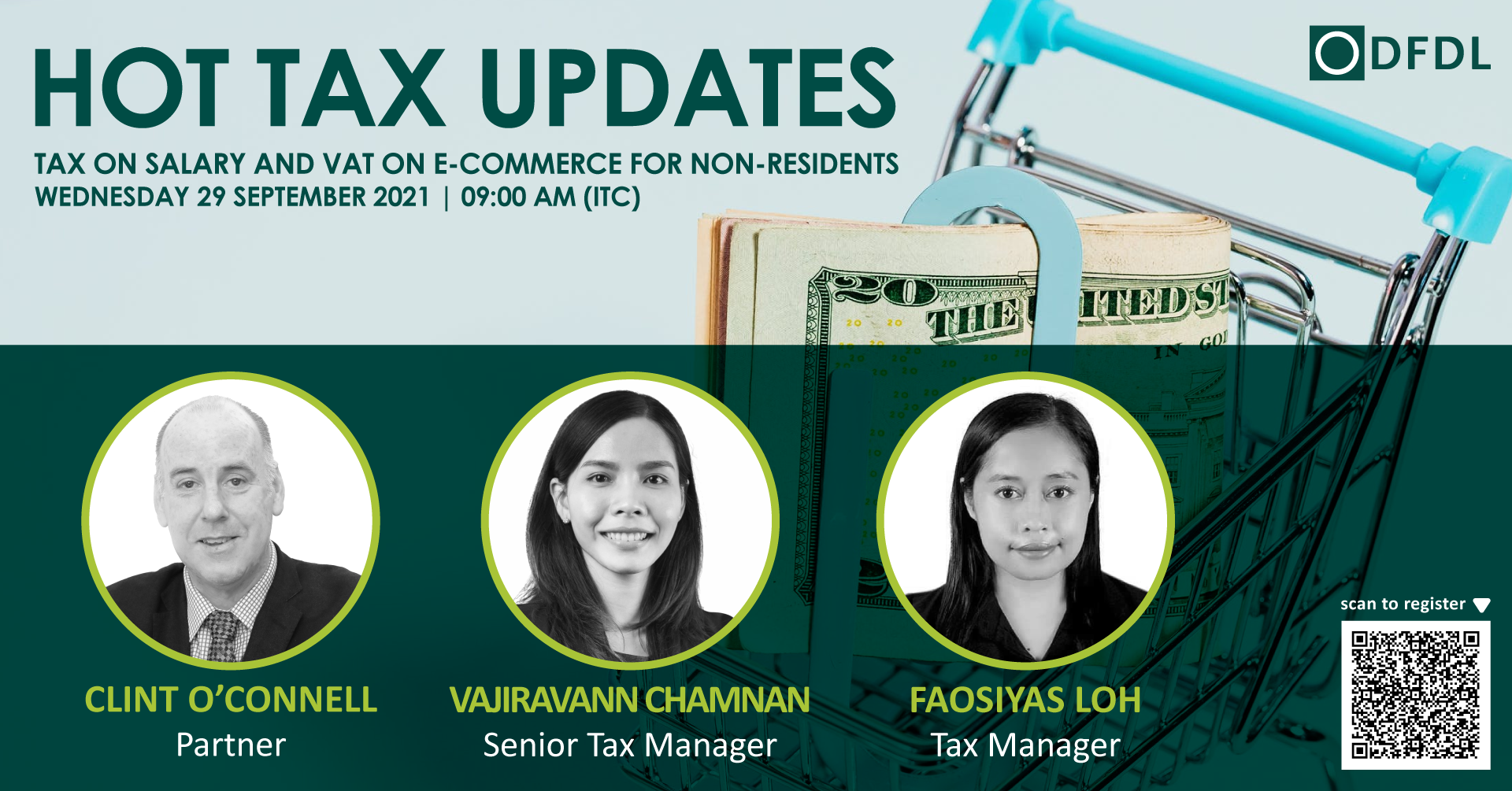Cambodia: Two New Prakas Now in Force – Tax on Salary and VAT on E-Commerce
On 8 September 2021 the Ministry of the Economy and Finance (“MEF”) issued Prakas 543 on Tax on Salary (“Prakas 543”) and Prakas 542 on the Rules and Procedures concerning the Implementation of Value Added Tax on E-Commerce Activities (“Prakas 542”).
Though these two new Prakas concern different subject matters they are equally significant in terms of their applicability to, and the effects they are likely have on, individuals and businesses operating both within and outside Cambodia.
Prakas 543 replaces and supersedes Prakas 1173 on Tax on Salary that had been in effect since 2003. It provides a much needed revamp and long overdue update to better reflect Cambodia’s evolving taxation regime and growing economy. Prakas 543 contains updates on key definitions, source of income, fringe benefits, and foreign tax credits. Prakas 543 came into effect on 8 September 2021 and its obligations are now in force.
Prakas 542 on the other hand provides further detail on the VAT registration requirements for non-residents following the introduction of Sub-decree No. 65 S.E on the Implementation of Valued Added Tax on E-Commerce Activities (“Sub-decree 65”) back on 8 April 2021. Sub-decree 65 laid down the conditions and mechanisms for collecting VAT on the provision of digital products and electronically traded services for consumption in Cambodia supplied by non-resident entities but without a taxable presence or permanent establishment (“PE”) in Cambodia through which tax on their local transactions would normally be captured. To find out more about Sub-Decree 65 please see read our earlier Client Alert here.
In addition to outlining the process and necessary documentation for non-resident e-commerce providers to register for VAT, the new Prakas gives greater clarity on important technical aspects of VAT obligations incumbent on non-resident e-commerce providers such as taxable value, time of supply, invoicing, and importantly, the duty to pay 10% VAT on business-to-consumer (“B2C”) and business-to-business (“B2B”) transactions. A new feature is the VAT reverse charge mechanism now introduced in regard to B2B transactions which requires a degree of added compliance not experienced before by Cambodia registered taxpayers that transact with non-resident e-commerce providers.
In response to the feedback and concerns raised by these two Prakas, DFDL will be hosting a webinar on Wednesday, 29 September 2021. We intent to guide you on the practical effects these Prakas will have on your business and how to prepare for the added compliance responsibilities they bring. Vajiravann Chamnan (DFDL Cambodia Senior Tax Manager) and Clint O’Connell (DFDL Cambodia Head of Tax Practice) in turn will go through the respective Prakas, explaining the various changes, required documents, deadlines, the kinds of activities that can now expect to be subject to VAT, penalties and much more. This session will end with a Q&A period moderated by Faosiyas Loh (DFDL Cambodia Tax Manager) where we expect lots of questions from our attendees, given the many unknowns surrounding practical implementation of these two Prakas. Don’t miss out on your chance to get ahead of these developments, hear from Cambodia’s leading tax experts, and have your concerns cleared up and addressed in full. Book your spot now as places are limited. Click here to find out more and to register.
Tax services required to be undertaken by a licensed tax agent in Cambodia are provided by Mekong Tax Services Co., Ltd, a member of DFDL and licensed as a Cambodian tax agent under license number – TA201701018.
The information provided here is for information purposes only and is not intended to constitute legal advice. Legal advice should be obtained from qualified legal counsel for all specific situations.
Contact
Partner, Cambodia Deputy Managing Director & Head of Cambodia Tax Practice
The post Cambodia: Two New Prakas Now in Force – Tax on Salary and VAT on E-Commerce appeared first on DFDL.
Link to article


 Post a comment
Post a comment Print article
Print article



